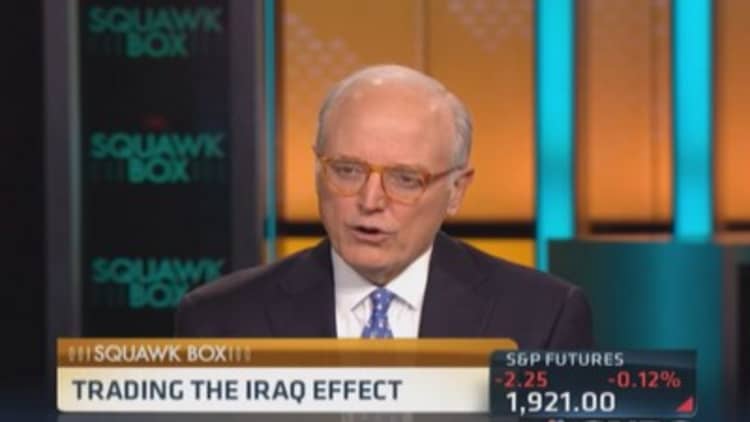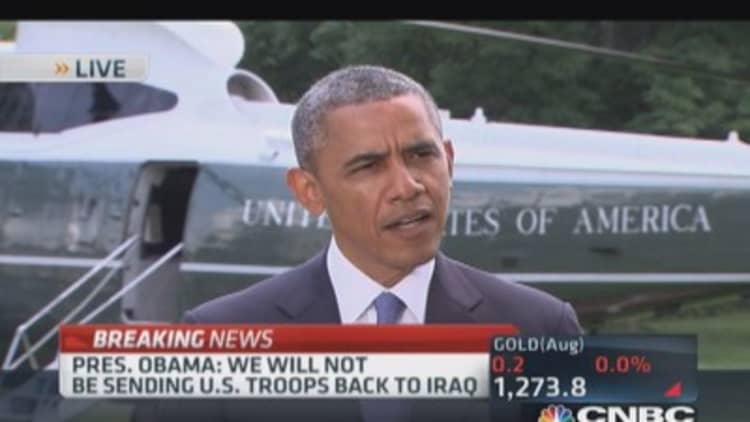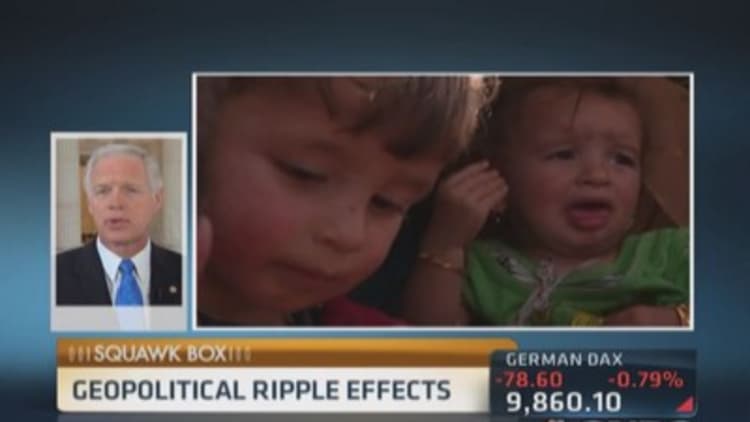
The deteriorating situation in Iraq "might play out for quite some time," but U.S. stocks should be able to weather the storm, said Howard Ward, Gabelli Funds' chief investment officer for growth equities.
On Friday, Ward told CNBC that he still thinks the will finish the year at 2,080, which would be a rise of 7.7 percent from Thursday's close.
The S&P closed at a record high on Monday. And even with three straight days of declines, the index is up nearly 4.5 percent in 2014. Ward does not see a correction right now.
Read MoreCramer: 'Something unexpected may be imminent'
The real action for investors concerned about Iraq is in the oil pits. "There's a fear factor … that clearly has pressured crude prices higher," Ward said in a "Squawk Box" interview.
Oil prices, if they keep rising, could hurt the economy and, in turn, the broader stock market. But he sees opportunity in oil stocks, which "tend to be highly correlated with the price of crude."
Gabelli Funds is invested in domestic energy stocks Pioneer Natural Resources, EOG Resources and Continental Resources. Ward said he plans on holding these stocks for a while, but won't advise new buyers to get in unless they too have a long-term time horizon.
"These stocks have done well. They're up on a spike. You could get a reversal here is things calm down."
Still, the unrest in Iraq really poses no real immediate threat to oil supplies, said Charles Maxwell, chairman of American DG Energy, on "Squawk on the Street." After all, Iraq produces about 400,000 barrels a day, or less than 1 percent of the world's total supply at 900 million barrels a day, he said.

Meanwhile, President Barack Obama said Friday the conflict should serve as a "wake-up call" for Iraqi leaders to "make hard decisions and compromises on behalf of the Iraqi people in order to bring the country together."
"Any action that we may take to provide assistance to Iraqi security forces has to be joined by a serious and sincere effort to set aside sectarian differences, to promote stability and account for the legitimate interests of all of Iraq's communities and to continue to build the capacity of an effective security force. We can't do it for them," Obama said from the South Lawn at the White House. "In the absence of this type of political effort, short-term military action, including any assistance we might provide, won't succeed."
"The United States will do our part, but understand that ultimately it's up to the Iraqis as a sovereign nation to solve their problems," he added.
Earlier, Secretary of State John Kerry said he expects President Obama to make "timely decisions" on Iraq, due to gravity of the situation.
The president is said to be considering airstrikes to help Iraq fight back the al-Qaeda-inspired militants pushing toward Baghdad after seizing much of their Sunni heartland.
Read MoreKerry: Expect 'timely decisions' from Obama on Iraq

Sen. Ron Johnson told CNBC the U.S. should never have let Iraq fall into chaos in the first place. The Wisconsin Republican, a member of the Foreign Relations and Homeland Security committees, said President Obama should not have pulled U.S. troops completely out.
"This is a tragedy that never should have happened. When President Obama came into office Iraq was largely stable," Johnson argued. "We should have had a status of force agreement, 15,000 American troops, this never would have happened."
The U.S. should help its allies stabilize the region, he urged, though he did not say whether he thought that should mean American military involvement.
Johnson was critical of Obama for inaction so far. "This is a stunning detachment by the American president," he said.
—By CNBC's Matthew J. Belvedere. CNBC's Drew Sandholm contributed to this report.


